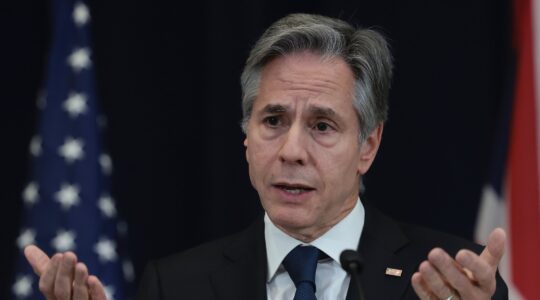WASHINGTON (JTA) — The removal of sanctions depends on Iran’s compliance with the terms of the nuclear deal between Tehran and six world powers, the White House said.
“We’ve been crystal-clear about the fact that Iran will have to take a variety of serious steps to significantly roll back their nuclear program before any sanctions relief is offered,” White House press secretary Josh Earnest said Thursday.
Earnest was responding to a statement by Iranian Supreme Leader Ayatollah Ali Khamenei that if the sanctions are merely suspended, Iran’s actions would be “at the level of suspension and not [changed] in a fundamental way.”
Earnest said sanctions relief would not kick in until Iran had complied with every condition in the deal, “from reducing their nuclear uranium stockpile by 98 percent, disconnecting thousands of centrifuges, essentially gutting the core of their heavy-water reactor at Arak, giving the IAEA the information and access they need in order to complete their report about the potential military dimensions of Iran’s nuclear program.”
The International Atomic Energy Agency is the United Nations’ nuclear watchdog.
“And then we need to see Iran begin to comply with the inspections regime that the IAEA will put in place to verify their compliance with the agreement,” he said.
The deal, reached in July, stipulates that Iran will scale back some of its nuclear program in exchange for suspension and gradual peeling back of international sanctions.
In his statement to clerics, which a state television anchorman read on Thursday, Khamenei is reported to have said “there will be no deal” if the sanctions are not lifted.
“We insisted that sanctions ought to be lifted, not suspended,” Khamenei said, according to the Iranian Tasnim news agency.
Khamenei also ruled out any cooperation with the U.S.-backed coalition fighting the radical Islamic State militant group in Syria and Iraq.
Part of the Iran deal refers to Iran’s Parchin facility, which inspectors, instead of conducting inspections themselves, would study through photos, videos and samples to be provided by Iranians, according to a corrected Associated Press report from last month.
Olli Heinonen, a former deputy director of the International Atomic Energy Agency – a U.N. watchdog – told the Times of Israel that he had “a lot of reservations about the reasonability and credibility of the arrangements.”





